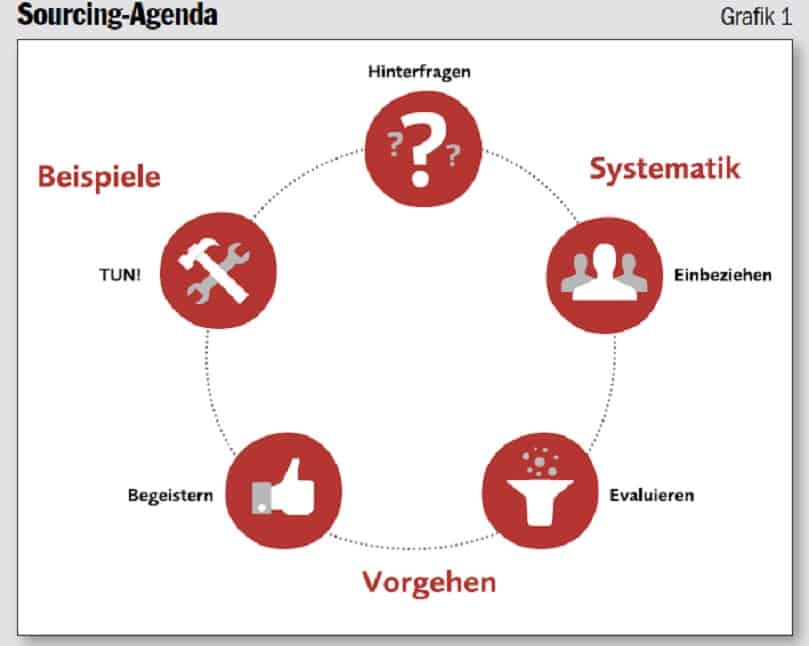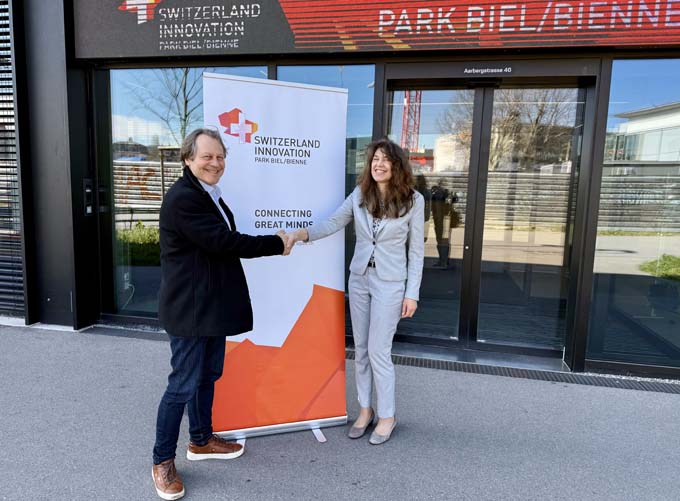Sustainable sourcing
Sourcing is on everyone's lips. Be it due to the increased tightening of regulations, the omnipresent, one-dimensional cost-saving exercises and the lack of own scales or due to a targeted strategic break-up of the value chain according to an industrialized approach.

Hand on heart: which banquiers are prepared to apply industrial approaches across the entire value chain or to learn from industrial experience? VP Bank and Liechtensteinische Landesbank (LLB) have collaborated on successful sourcing projects.
Consistently ask questions
The first step for successful sourcing starts with questioning your own business model. This includes, for example, the need to be clear about which are the real (and not the desired) core competencies and which areas can be outsourced. The big picture of the company and the strategies derived from it are indispensable prerequisites for this. Central points are clear statements on the possible partner management and framework conditions. Without strategic anchoring, a sourcing topic can quickly get into trouble. Another central starting question: Which
Added value for the customer
What added value does this create for the end customer - or rather, what does the end customer feel from the outsourcing? What is critical for the end customer? Nevertheless, the management must have clarity about its responsibility and the predictability of the sourcing.
Time to mature
The development and implementation of an effective sourcing strategy and the relentless involvement of all stakeholders required one thing above all: time. It is also important to remember that not all stakeholders are equally familiar with the topic and may favor other topics. This momentum can be elegantly counteracted with an effective strategy. Imposing sourcing by decree is not very effective.
Sourcing efforts need time, freedom and the necessary maturity to be able to change at the right moment. Experience shows that these processes take a long time to mature. Reflexive sourcing - as well as the outsourcing of a problem area - is doomed to failure.
Evaluation criteria
The evaluation of possible partners follows the classical approach:
- Longlist (Request for Information)
- Shortlist (Request for Proposal)
- Presentations on site
- Reference visits
- Third-party information
If, for example, the corporate strategy contains clear specifications for partner management (both technically and in terms of partnership), this process step can be massively shortened and at the same time demonstrates entrepreneurial foresight. Depending on the sourcing object and possible sourcing solution, it must be clear what is intended. If it is a cost case and "apples are compared with apples" - whereby, to remain with the apple varieties, a Boskop is by far not a Gravensteiner. If, on the other hand, a strategic, entrepreneurial component is added, the ideal conditions for sustainable sourcing are given.
Other critical success areas emerge in the context of the evaluation: On the one hand, due consideration should be given to future-oriented governance (from core, leadership to support processes) and contractual design, including eventual deconstruction. On the other hand, both partners must be culturally fit and coherent. A fit at the management level is not sufficient for sustainable success. A cultural non-fit inevitably affects the end customer, be it through a lack of quality or through corresponding behavior.
Broad and conscious motivation
Successful sourcing involves inspiring employees. People,
Get employees on board
who understand the goal of sourcing and discover new opportunities of their own in it are the basis for continuous improvement or simply: innovation. This enthusiasm can be strengthened, for example, by relocating possible operating sites of the sourcing partner to the vicinity of the outsourcer or by allowing those affected to learn and take responsibility for new, additional areas of responsibility. This also includes managing expectations of the new employer. This part of the process is based on many conversations and ultimately trust. The authenticity of the partner is crucial. In addition to the employees, other stakeholders at the societal level (authorities, regulators, neighbors, etc.) must be involved, depending on the topic.
The most difficult thing is doing
Only with the successful implementation and daily application is sourcing operationally launched. This action involves the conscious decision to change the lever and at the same time to actively live and develop partner management. This action is based on a willingness to change that is exemplified and demanded by the leadership - in short: discipline. The management sees change as an investment, continuously supports the will to persevere, provides security in critical phases and shows genuine appreciation and respect for the employees. It has a clear goal in mind that is constantly repeated (feu sacré). At the same time, future-oriented leadership creates
Appreciation and respect
free space for sourcing possibilities and helps to reduce complexity. Even if the quote from Antoine de Saint-Exupéry seems a bit strained - it gets to the heart of the matter: "If you want to build a ship, don't drum up men to procure wood, assign tasks and divide up the work, but teach them to long for the wide, endless sea."
Successful examples
In March 2010, VP Bank and Liechtensteinische Landesbank (LLB) announced their intention to collaborate more closely in the areas of logistics and IT. In the meantime, various sourcing objects have been successfully realised. Using the examples of "Printing and dispatch" and "Establishment of a joint purchasing company", the approach will be roughly illustrated. These two cooperation projects bring clear and measurable results.
"Printing and shipping" - classic outsourcing
As early as 2009, the two companies thought about finding a sensible joint solution for the "printing and shipping" area. This area is not part of the core business and is very investment-intensive. After both partners defined possible breaking points in this process, an invitation to tender was issued. Based on these predefined criteria, a pre-selection was made. (Around ten companies showed interest, of which four were examined in depth). The decision was made in favour of the Trendcommerce Group from St.Gallen, which, together with the two banks, set up a perfectly functioning printing and dispatch centre in Liechtenstein within four months. Our experience to date has been very pleasing and fully meets our expectations.
A prerequisite for the implementation of an outsourcing solution was that our high security requirements were covered 100 percent and that the partner had sound experience in mass printing and mailing. In terms of security, we invested significantly more than in a classic outsourcing project: all three parties contributed their knowledge and used it to form the end product, which is continuously verified by external test certificates. The benefit for the banks: printing is faster, the quality of the documents is massively higher and further graphical possibilities are open. The benefit for Trendcommerce: Thanks to its expertise in the Principality of Liechtenstein, Trendcommerce was able to win Raiffeisen as a customer in Switzerland and create a completely new high-security printing and dispatch centre - thus: a classic win-win situation.
Particular challenges in this sourcing object were: To make two companies seeking cooperation in this area "equal" to the outside world.
Expectations are fulfilled
and to realise the task with a third party that completely rebuilds the entire operating facility. Both banks committed themselves to an open and trusting cooperation without any ifs and buts. From the beginning it was clear that this sourcing object should be solved in partnership and an entrepreneurial governance should be aimed at. Today, both companies are customers and not shareholders of Trendcommerce Liechtenstein AG and manage the partnership relationship via defined service level agreements.
"Data Info Services AG" - Joint Venture
At the same time, both banks founded a joint purchasing company for financial information systems. In an initial phase, Data Info Services AG procures Telekurs licenses for the two founding banks. Through this so-called "pooling" of licenses, advantageous conditions can be achieved when purchasing financial information, which in turn substantially reduces the cost base. In this scale-driven example, too, a solution was built that is open to other financial market participants.









